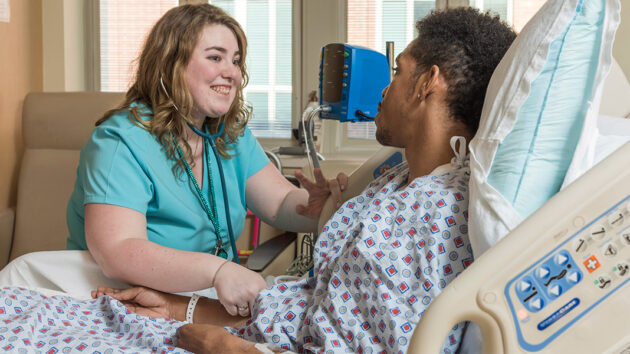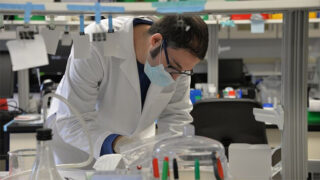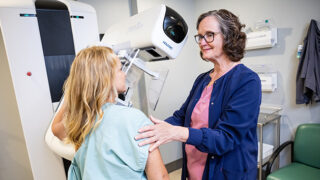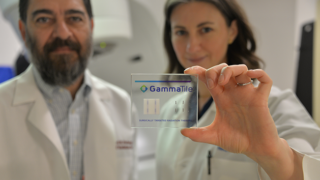Compassionate Care, Leading Expertise
With accredited cancer care centers within an academic medical system, the Albany Med Health System offers patients numerous benefits that include a team approach to care, state-of-the-art services and equipment, and clinical trials and new treatment options.
We offer services such as interventional radiology for cancer detection, biologic therapies, immunology and newer forms of radiation oncology for cancer treatment, non-invasive stereotactic radiosurgery, pediatric oncology, advanced surgical oncology, genetic counseling, and laser ablation.
Care Throughout the Capital Region
Albany Medical Center, the anchor of the Albany Med Health System, is accredited by the Commission on Cancer of the American College of Surgeons as an Academic Comprehensive Cancer Program, a quality program that holds cancer treatment programs to the highest standards of care. As an academic medical center, many cancer services are offered at Albany Medical Center.
Comprehensive cancer care services are offered at the C.R. Wood Cancer Center at Glens Falls Hospital and Saratoga Hospital, which also are accredited as Community Cancer Programs by the Commission on Cancer.
NYOH Connection
We maintain a partnership with New York Oncology Hematology (NYOH). This includes care, treatment, and access to clinical trials. NYOH is available at Albany Medical Center and has an office adjacent to Columbia Memorial Health.
Clinical Trials
Find out more about clinical trials available in the Albany Med Health System.
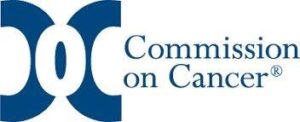
Find Out More
Use the dropdowns below to search for types of benign or cancerous conditions to find more information, including physicians and locations.
- Bone forming tumors
- Cartilage forming tumors
- Ewing's sarcoma
- Fibrous tumors
- Osteosarcoma
- Chondrosarcoma
- Metastatic bone disease (carcinomas)
- Cystic tumors
- Unknown and tumor simulators
- Lipomas
- Hemangiomas
- Ganglions
- Nerve sheath tumors
- Liposarcoma
- Undifferentiated pleomorphic sarcoma
- Synovial sarcoma
- Rhabdomyosarcoma
- Leiomyosarcoma
Find care providers and locations on our Orthopedic Oncology pages.
- Acoustic neuroma
- Astrocytoma
- Brain metastases
- Benign brain tumors
- Choroid plexus carcinoma
- Craniopharyngioma
- Embryonal tumors
- Ependymoma
- Glioblastoma
- Glioma
- Medulloblastoma
- Meningioma
- Oligodendroglioma
- Pediatric brain tumors
- Pineoblastoma
- Pituitary tumors
Learn more about services to treat brain tumors, including providers and locations.
Learn more about breast cancer services, including preventive and benign breast care.
- Acute leukemia
- Chronic lymphocytic leukemia
- Chronic myelogenous leukemia
- Myelodsyplasia
- Hodgkin's lymphoma
- Non Hodgkin's lymphoma
- Multiple myeloma
- Amyloidosis
Learn more about providers, locations, and services to treat blood cancer.
- Cervical cancer
- Endometrial cancer
- Ovarian cancer
- Uterine cancer
- Vaginal cancer
- Vulvar cancer
- Oral cavity cancer
- Parathyroid disorders
- Salivary gland (parotid/submandibular)
- Tonsil cancer
- Dysphagia (swallowing disorders)
- Sentinel lymph node biopsy
Our radiation oncology team is a leader in state-of-the-art technology and treatment methods for adults and children. We work collaboratively with radiation oncologists, nursing specialists, medical physicists, dosimetrists, radiation therapists, and supportive care professionals. Our team will put together a plan that is best suited for you and your condition.
- Basal cell carcinoma
- Squamous cell carcinoma
- Melanoma
Surgical oncology is a field of cancer care that focuses on surgery to diagnose, stage, and treat cancer, and to manage some cancer-related symptoms. Surgical oncologists are additionally trained in advanced surgical oncology methods and tumor biology and behavior. You will often hear the term hepatobiliary associated with surgical oncology.
Learn more about Surgical Oncology at Albany Medical Center
Watch this video of surgical oncologist Dr. Ankesh Nigam on the importance of teamwork and new ideas.
- Lung cancer
- Esophageal cancers
- Lung tumor, nodule, and metastasis
- Metastatic cancers affecting organs inside the chest
Learn more about thoracic cancer care on our Pulmonology pages
- Bladder cancer
- Kidney cancer
- Prostate cancer and benign prostate conditions
- Testicular cancer
Oncology Social Workers
Provide emotional support to patients and families, refer to local support groups, help with transportation, health insurance, and financial issues, and link to community resources like food assistance and shelter.
Visiting Nurses
Visiting Nurses is a member of the Albany Med Health System and plays a role in home care for cancer patients.
Breast Nurse Navigators
Specialize in helping newly diagnosed breast cancer patients with follow-up appointments, breast imaging, physical therapy, genetic testing, and financial assistance.
Registered Dieticians
Provide dietary strategies for managing side effects and make diet and lifestyle recommendations for cancer prevention and survivorship.
Speech Pathologists
Help patients whose cancers involve the head and neck to maintain and improve their speech and swallowing abilities before, during, and after treatment.
Palliative and Supportive Care
Partner with oncologists to maximize quality of life by assisting with pain and symptom management, as well as navigating complex medical decisions.
Genetic Counselors
Evaluate patients with personal and family histories of cancer. Order and interpret genetic tests, and help patients make informed decisions about cancer prevention and management.
Psychologists and Psychiatrists
Provide individual, group, and family psychotherapy and medication management for patients and loved ones experiencing anxiety, depression, and substance abuse.
Our patients have access to the following services during and after cancer treatment:
- Survivorship care plans
- Individual and family counseling support and referrals
- Assistance with disability and family leave benefits
- Financial assistance and counseling
- Lymphedema physical therapy
- Genetic counseling
- Ostomy nursing care
- Nutrition counseling
- Plastic surgery care and follow-up
- Speech and swallowing therapy
- Cardio-oncology program for long-term cardiac follow-up
- Coordinated transition of care from pediatric to adult oncology
- Screening programs
Comprehensive screening helps patients identify emotional, social, and financial concerns that may impact them during or after treatment. An oncology social worker is available to assist with these concerns. Referrals can be made for services close to home.
Referral services include:
- Support groups for patients and caregivers
- Grants and financial assistance
- Health insurance counseling
- Wellness and exercise programs
- Tobacco cessation
- Legal assistance
- Home health care
- Volunteer caregiving
Cancer Research at Albany Medical College
In a quest to discover more about the basic mechanisms underlying cancer, exciting biomedical cancer research is conducted in the labs at Albany Medical College in the Department of Regenerative and Cancer Cell Biology.
